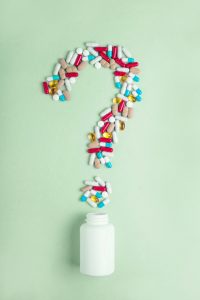Loss of libido is no laughing matter. In fact, it can have serious adverse effects, and it can lead to a significantly decreased quality of life. Even a slight decrease in your sex drive can already result in relationship dysfunction, especially when there’s a great mismatch between your libido and that of your partner’s.
Unfortunately, there are too many factors that can lead to loss of libido. Medical conditions like hypogonadism, for instance, can cause your sex drive to become almost non-existent. Other factors that can also contribute to reduced sex drive include depression, sexual performance anxiety, systemic illnesses, and even certain medications.
Medication-Induced Loss of Sexual Desire
There are actually numerous medications that have adverse sexual effects such as reduced sexual desire. Selective serotonin reuptake inhibitors, for instance, are notorious for their negative effects on erectile function.
Although the loss of libido is closely tied to other sexual dysfunctions, drug-induced loss of sexual desire is not always accompanied by erectile dysfunction or anorgasmia, and medications that may cause impotence do not necessarily cause loss of libido.

Your libido is actually influenced by mental, physical, and hormonal factors. Medications that may cause reduced libido can affect either the hormonal mediators or biological factors of sexual desire.
Medications that can adversely affect your libido usually have a mode of action that affects either your testosterone levels, your prolactin levels, or your serotonin levels.
Adverse Sexual Effects of Antihistamines
Antihistamines work by inhibiting the effects of histamine. Antihistamines are popularly used to treat allergies, runny nose, nasal congestion, sneezing, itching, watery eyes, hives, and skin rashes. There are also cases wherein antihistamines are taken to help with anxiety, difficulty sleeping, and even motion sickness.
Oral antihistamines are usually available over the counter, either as capsules, chewable tablets, pills, or in liquid form. There are also other medications such as decongestants that contain antihistamines.
First-generation or older antihistamines are known to have several side effects. In fact, first-generation antihistamines such as diphenhydramine and chlorpheniramine are known to have strong sedative effects.
First-generation antihistamines also have anticholinergic side effects including agitation, urinary retention, and constipation. Second-generation antihistamines may also have similar side effects, but usually only when taken in high dosages.
Among the various types of antihistamines, diphenhydramine is the one that’s known to have adverse sexual effects like reduced libido. It can also cause temporary erectile dysfunction, and other antihistamines like dimehydrinate, hydroxyzine, meclizine, and promethazine may have similar effects as well.
Because first-generation antihistamines typically cause severe drowsiness due to their sedative effects, it may not be a good idea to take such medications if you’re planning to have sex with your partner. You may just end up falling asleep, leaving your partner dissatisfied.
Other Medications That Affect Your Libido
Depression and sexual dysfunction often go together. Unfortunately, many antidepressant medications are notorious for their negative effects on your sexual function. Selective serotonin reuptake inhibitors and selective norepinephrine reuptake inhibitors both increase serotonin activity, which can cause you to lose your libido.
That’s because serotonin actually has inhibitory effects on your sexual function. This means that the higher your serotonin levels are, the less likely you’ll be interested in sex and the more likely you’ll have difficulties getting a hard-on.
On the one hand, tricyclic antidepressants exert anticholinergic effects. Acetylcholine, just like nitric oxide, is actually a pro-erectile neurotransmitter. By blocking the activities of acetylcholine, tricyclic antidepressants make it hard for you to achieve erections, and they also cause you to have less drive for sex.
Other psychotropic drugs like lithium, anticonvulsants, and antipsychotics are also known to suppress libido. In particular, antipsychotic drugs that block the activities of dopamine cause your prolactin levels to increase, thereby resulting in reduced libido.
Examples of this type of medication include thiothixene and chlorpromazine. Risperidone, an atypical antipsychotic, is also known to cause sexual dysfunction and can definitely reduce your libido when taken in high dosages.

Aside from psychotropic drugs, there are also medications taken for cardiovascular diseases that can cause you to lose your sex drive. Anti-hypertensive medications such as beta-blockers, for example, are known to cause reduced libido. Thiazide diuretics and alpha2-adrenergic agonists can also have negative effects on your sex drive.
In addition, selective beta-blockers like atenolol have dose-dependent effects on your libido, but if you lower your dose, it may help restore your sex drive. However, non-selective beta-blockers such as propanolol can cause severe sexual problems and not just reduced libido.
Other medications that affect your libido include finasteride and dutasteride, which are both used to treat benign prostatic hyperplasia. These medicines reduce your dihydrotestosterone levels which, in turn, results in lower testosterone levels. As you well know, any decrease in your levels of testosterone can have negative effects on your libido.
Enhancing Your Libido Naturally
If you’re taking medications that negatively affect your sex drive, there are ways for you to restore your libido even if you don’t stop taking your medicines. For instance, zinc is popularly known as beneficial to your libido, and you can easily increase your zinc levels by eating zinc-rich foods like oysters.
Alternatively, you can also increase your consumption of foods that are known to help boost testosterone levels. Any food that can help raise your levels of testosterone will definitely be helpful in restoring your libido. There are also many fruits and vegetables that are known to have aphrodisiac properties, just like avocados and pomegranates.
One convenient way for you to increase your testosterone levels and enhance your libido is by taking supplements that contain Tongkat Ali, fenugreek, Ashwagandha, Tribulus terrestris, and Horny Goat Weed.
These herbs are all rich in antioxidants, thus they offer many health benefits. Plus, they’re also known to positively affect testosterone levels. In addition, they are also beneficial in improving your libido, enhancing your erectile function, and even increasing your fertility.
If you want to see great improvements in your sex drive and your overall sexual performance, these incredibly pro-sexual herbs can definitely help you.







